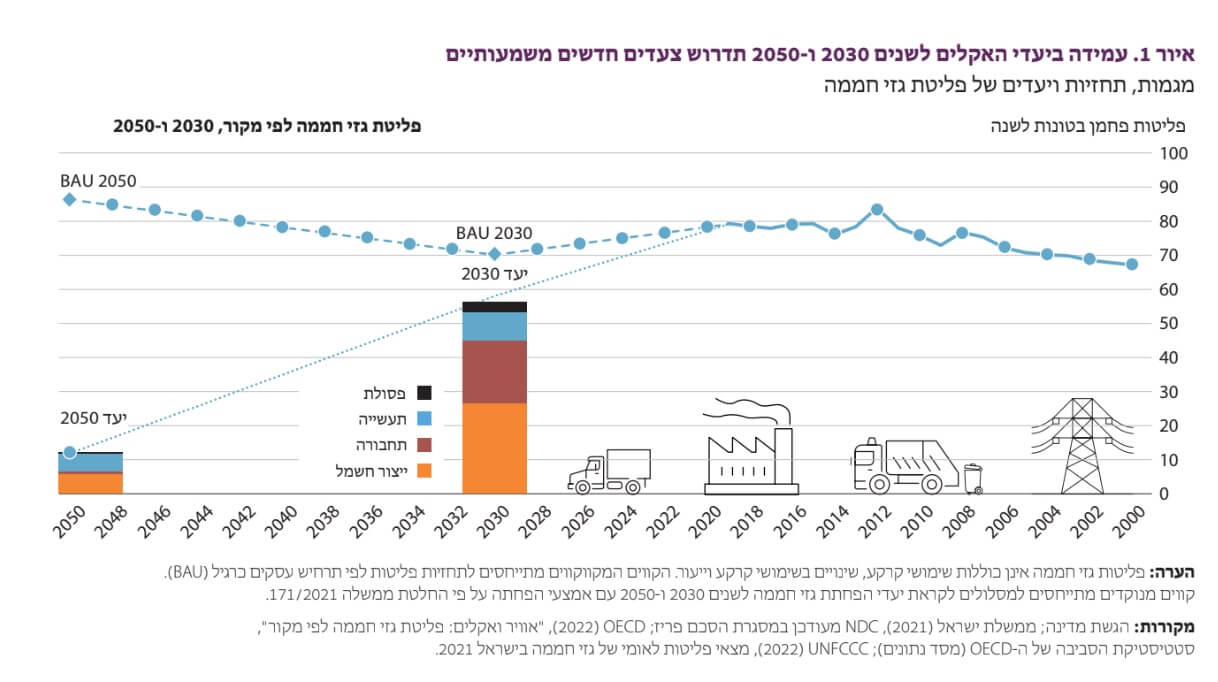According to the organization's report published this week in Israel, 5% use renewable energy sources, if we were closer to 12% - the OECD average, we could easily avoid the shame of self-initiated power outages during the day in a hot country like ours

Friday (2/6/2023) was a day of extreme heat reaching 38 degrees on the coastal plain, in several areas heat records were recorded for the month of June: 43.8 degrees were measured in Beit Dagan and 43.7 degrees were measured in Kibbutz Negva. About 300 Israelis were cut off from electricity today for about half an hour to an hour - a different area each time, because the system is unable to withstand the load of electricity demand.
This is during the daytime, and if they had not deliberately set foot on the development of renewable energy - especially solar energy, it would certainly be possible to satisfy the demand. Instead, they add sin to crime and open coal plants, this in addition to the approval given this week to two gas-powered power plants despite the experts' warnings.
Just two days earlier, on Wednesday, at a joint event of the Ministry of Environmental Protection and the OECD, the OECD report examining Israel's environmental performance over the past decade was published; In this report, Israel received a resounding failing grade. The report states: without climate legislation, implementation of carbon pricing and elimination of harmful subsidies on fossil fuels - Israel will not meet the climate goals. The main points of the report with annotations.
As of this hour: 120 fires in open areas starting in the morning
— Israel Fire and Rescue (@102_IL) June 2, 2023
Firefighting and rescue teams have been working since the early morning across the country in cooperation with the forces of the Israel Defense Forces and RTG to extinguish thorn and grass fires that spread under the cover of the winds. pic.twitter.com/gjYmfVUDNv
Israel's environmental performance report, prepared by the OECD, was published in the presence of the Minister of Environmental Protection, Idit Silman, and Joe Tyndall, head of the OECD's Environmental Administration; The report performs a comprehensive assessment and analysis of the progress in achieving the environmental policy goals of the State of Israel over the past decade, and includes recommendations for improving environmental performance.
Energy intensity - total energy supply per capita 2.3 satan (the average of the OECD countries is 3.8); Energy from renewable sources (% of total energy supply) 5% when the OECD average is 12.
Greenhouse gas intensity - Greenhouse gas emissions per capita 8.8 tons per capita in 2021, the last year for which there is data in this area.
The report is based on economic and environmental data and information gathered during discussions by OECD experts with representatives from various government ministries, local government, industry, civil society and academia in Israel. In addition to this, the report included insights from a discussion held between an Israeli government delegation and representatives of other member states within the OECD working group for environmental performance. In the following, we will present excerpts from the report that deal with Israel's preparation or, rather, the miscalculations for the climate crisis, with requested explanations.

Big carbon footprint
Israel's carbon footprint increased steadily during the years 2014-2020 but began to decrease slightly in recent years. Both the total emissions and per capita emissions of greenhouse gases and the air emissions of major pollutants have slowly become disconnected from GDP, mainly due to the rapid replacement of coal with natural gas in the energy mix (which of course is not enough to even scratch Israel's obligations to reduce carbon emissions because gas is also a fuel from minerals A.B.).
Climate ambitions have increased, but the country is not on track to achieve the goals. Israel has increased its climate ambitions in recent years. The country set a greenhouse gas reduction target of 85% for the year 2050, as well as sectoral targets for greenhouse gas emissions from electricity production, solid waste, transportation and industry, before announcing the overall goal of carbon neutrality by 2050. However, Israel is not on track to reach these targets with existing means (Figure 1).
Achieving the climate goals requires decisive action in all sectors. Electricity generation is the largest source of greenhouse gas emissions in Israel, followed by transportation, industrial production and construction. Although the ability to produce solar electricity has been expanding in recent years, it faces obstacles such as limited land availability (and the actual interference of the electric company that recently began to withhold funds due to owners of solar panels on AB roofs). To deal with the country's high dependence on cars, Israel must develop a coherent interagency strategy for a low-carbon transition in the transportation sector and prioritize investment in public transportation. Climate change preparedness efforts are at an early stage.
In 2018, the government established a climate change preparedness administration under the responsibility of the Ministry of Environmental Protection in order to formulate strategies and action plans to increase Israel's resilience to climate change. On top of that, climate change has recently been integrated into the assessment of the state of threats to national security. However, preparedness measures tend to focus on technological solutions rather than nature-based solutions for the prevention of natural disasters caused by climate change. A small number of municipalities are taking the initiative in the preparation efforts.
More of the topic in Hayadan:
- The Ministry of Higher Education is developing a mapping tool for Israel's risks to prepare for the climate crisis * Israel joins the zero government program
- Why is the climate crisis absent from the Israeli media?
- Do young people in Israel care about the climate crisis?
- Survey: Israelis underestimate the risk of the climate crisis
- State Comptroller: Israel's progress in dealing with the climate crisis - negative to zero

8 תגובות
Yesterday the news revealed the reason for the power outages:
Poor communication between the Nega company and the electric company, which manifested itself in the fact that the instruction from Nega to activate additional power units at the electric company arrived late, and due to the fact that the electric company takes two days to start a coal unit, the instruction was no longer effective and therefore was not carried out.
There are roofs.
Great.
Shows that the Israelis are still not as crazy as the Europeans and Americans, although it is only temporary. Tens of billions of dollars and euros are poured here to fool us too.
And the demagogic claim as if the power outages would have been saved if we turned more nature reserves in the prairie into deserts of solar absorption, and built more bird grinders on their migration routes... come on.
The good news is that when Israel stops being a democracy all the people who use modern technology the most will leave
15 billion NIS for the sectors.
The hypersonic weapon development project was cancelled. Bennett established the hypersonic laboratory at the Technion two years ago. Iran announced that it has a hypersonic weapon that disables Israel's entire defense system.
There is no money for new power plants.
The main thing is that the budget passed.
awkward. Even from the little that I know personally as a private person, I see a lot of deceptions and mistakes in this article. Why does the scientist, who claims to be a scientific website, throw all scientific ethics out the window when he deals with these issues? Is it because it is difficult to bring the truth and still convince of the necessity of hyping the climate "crisis"?
And who else do you want us to learn from? From the European Union! Those who didn't know how they would energetically survive the last winter. People who preferred Euro ideologies over the welfare of their people.
Remind you where 80% of the solar panels in the world are made?
Make reverse gota
It is the desire to integrate renewable energies that causes the power outage
Power outages are just one marker of a large selection of failures,
Because for many years Israel has been going down the ladder of "progress",
When I was young, my father insisted on drawing the map
So that Israel is included in Europe,
It was hard for him to come to terms with the fact
that he and his family live in the Levant - literally,
Over the years, leaders and intellectuals have been transformed
to associate Israel with the West / the advanced world,
But at the same time, they did something to "promote" ignorance and ignorance
So much so that today Israel is somewhere
In "Behind the Fox".